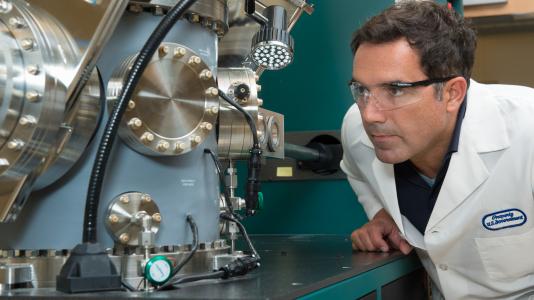National labs team to develop better, cheaper fuel cells

The U.S. Department of Energy’s (DOE’s) Argonne National Laboratory has joined a project funded by DOE’s Fuel Cell Technologies Office to enhance the performance and durability of polymer electrolyte membrane (PEM) fuel cells, while simultaneously reducing their cost.
“The cost and durability of current PEM fuel cells are major barriers to their commercial use for stationary or transportation power generation,” said Los Alamos’s Rod Borup, director for the five-institution fuel cell consortium. “By bringing together the proven expertise in our consortium laboratories and building on our existing capabilities, we plan to demonstrate world-class improvements exceeding the 2020 targets set by DOE.”
The PEM fuel cells produce electricity through the reaction of hydrogen and oxygen — their only emission being the water formed when the proton and electrons combine with the oxygen. Thursday, Oct. 8, was National Hydrogen and Fuel Cell Day, dedicated to increasing awareness of this renewable energy technology. The date is a nod to hydrogen’s atomic mass: 1.008.
Fuel cell technologies can significantly benefit the nation’s energy security, the environment and economy — offering reduced oil consumption and highly reliable grid-support, reduced greenhouse gas emissions and air pollution and expanded renewable power use and highly efficient conversion.
While PEM fuel cells are deployed in demonstration vehicles and are beginning limited commercialization, they still fall short of DOE targets for this technology, which are required for widespread consumer acceptance.
About the Consortium
Consortium members in this effort also include Lawrence Berkeley National Laboratory, with Adam Weber serving as the consortium’s deputy director; Los Alamos National Laboratory; the National Renewable Energy Laboratory; and Oak Ridge National Laboratory.
The consortium will coordinate national laboratory activities related to fuel cell performance and durability, provide technical expertise, and integrate activities with industrial developers. The consortium will also serve as a resource that amplifies the impact of DOE’s Office of Energy Efficiency and Renewable Energy’s Fuel Cell Technologies Office (FCTO) by leveraging the core capabilities of the member laboratories. Dimitrios Papageorgopoulos, the Fuel Cells program manager for FCTO, will lead the consortium.
Argonne will coordinate the improvement, support performance and durability of the fuel cell electrocatalyst, and assist in the modeling and validation of fuel cell performance and degradation. The laboratory’s effort will be led by Argonne scientist Debbie Myers and Argonne engineer Rajesh Ahluwalia.
About Argonne’s Fuel Cell Program
Argonne has been actively involved in fuel cell and hydrogen R&D since the late 1970s. The laboratory conducts basic and applied research in a wide range of technologies, from the development of new catalyst technology that reduces the cost of polymer electrolyte membrane fuel cells to software tools for evaluating the environmental impacts of fuel cell adoption.
Argonne National Laboratory seeks solutions to pressing national problems in science and technology. The nation’s first national laboratory, Argonne conducts leading-edge basic and applied scientific research in virtually every scientific discipline. Argonne researchers work closely with researchers from hundreds of companies, universities, and federal, state and municipal agencies to help them solve their specific problems, advance America’s scientific leadership and prepare the nation for a better future. With employees from more than 60 nations, Argonne is managed by UChicago Argonne, LLC for the U.S. Department of Energy’s Office of Science.
IMAGE GALLERY:

